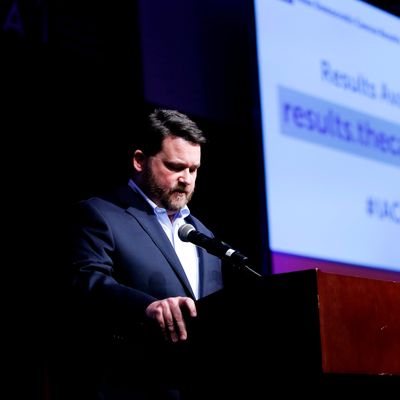
It took almost no time from the delay in reporting the results of the Iowa Caucus for the online conspiracy theorizing engine to start up. Employees for the companies responsible for the app that seemed to have caused the Iowa failure were quickly linked to Pete Buttigieg’s 2020 campaign and Hillary Clinton’s 2016 effort; Twitter threads were spun out based on FEC records showing that Buttigieg’s campaign had paid the app developer. And, come on, the company that made that app was called Shadow, Inc. Was “Masonic Unmarked Helicopters, LLC” already trademarked?
Just as quickly as the conspiracy theories, of course, came the debunkings, fact-checking, and sanctimonious tut-tutting over their proliferation. (Also in the mix: Republicans like Trump’s campaign manager trying to play up the conspiracy theories to discredit the Democratic Party, not that it needed much help.) But what was the point?
Even liberals who once fretted over the increased visibility of conspiracy theories on the right have recently turned toward conspiracy thinking themselves — about Trump’s tax returns, or his relationship to Russia — as a mode of political engagement. Every faction in American politics now has a series of pet conspiracy theories believed by a significant portion of its supporters. We live in the age of red yarn and corkboard, of YouTube hypothesis and Twitter-thread investigation. No one seems able to avoid falling back into conspiracy-theory logic when explaining geopolitical events.
Why, though? There is, fittingly, no easy explanation for the appeal or spread of conspiracy thinking. Instead, there are many, well, theories — some overlapping and reinforcing, some contradictory, all of them useful in understanding the shadowy power of the conspiracy theory in the 21st century.
Conspiracy theories are a long-established method of organizing and understanding the modern world.
It’s worth asking: Do we actually live in a particularly paranoid era? As a way of understanding the world, the conspiracy theory has deep roots in American politics — beyond the New World Order and the Red Scare and back into the 18th century. Around the time of the Revolutionary War, conspiracy theory wasn’t the provenance of marginalized cranks, but a basic mode of thought for the thinkers and revolutionaries, whose belief in a “comprehensive conspiracy against liberty,” as the historian Bernard Bailyn wrote, “lay at the heart of the Revolutionary movement.” They weren’t alone: obsession with conspiracy was also at the heart of nearly every turn in the French Revolution just a few years later; pamphlets from the era could easily compete for clicks against the stupidest stuff on YouTube.
The conspiracy theory, most easily defined as an account of the world in which power is wielded and change effected by small, secret groups, has antecedents in anti-Semitic and anti-Catholic myths of the Protestant Reformation (and before). But it only began to flourish as theory during the Enlightenment, with the emergence of what we might call modernity — a recognizable political culture and a secular sense of history, in which the world follows rational, legible patterns of cause and effect, and in which humans, rather than God, are agents of socio-political transformation. This “man-centered causal history,” according to Gordon Wood, meant that “all enlightened thought of the 18th century was structured in such a way that conspiratorial explanations of complex events became normal, necessary, and rational.” Any seeming boom in conspiracy theories likely represents as much the ascendance of a mode of thinking (or even a theory of politics) inherent to modernity as it does a significant change to culture or discourse.
Conspiracy theories are a way for people to exert control over or within unstable, complex systems.
If the Enlightenment gave people the tools to think in terms of conspiracy, it’s the condition of modernity itself that’s made them particularly attractive. For centuries now we’ve lived in an increasingly interconnected, interdependent world, ruled over by shifting and unstable arrangements of bureaucratic institutions and free markets. In theory, this world is driven by human agency; in practice, any particular individual’s agency is sharply limited and often irrelevant. For people living through a ruinous financial crisis or devastating climate change — or even through rapid social change that has no material effect on their lives — it can be hard to make sense of a cascade of events that seem to have no plainly evident causal chain, or even identifiable human authors. How do you account for a world we’re meant to master, but is so complex its workings seem essentially opaque? In steps the conspiracy theory, which the historian Ed White has called “a vernacular attempt to think through a great conundrum of social theory, the relationship between agency and structure.”
What’s at stake for conspiracy theorists in this understanding isn’t simply explaining a confusing world, but asserting some kind of power over or within it. “People who feel powerless are more likely to believe in conspiracy theories,” the psychologist Jan-Willem van Prooijen says, and conspiracy theories can help rectify their situations. The political scientists Joseph Uscinski and Joseph Parent express a similar sentiment somewhat more bluntly in the title of their 2011 paper: “Conspiracy Theories Are for Losers.” Uscinski and Parent argue that “vulnerable groups” in a state of political powerlessness use the “strategic logic” of conspiracy theories to “sharpen internal cohesion and focus attention on dangers.” Even beyond strategic benefit or material power, a conspiracy can offer symbolic control over a world from which a person feels particularly alienated — I don’t like my life; I may not be able to change it; but at least I can understand how it all works and know it’s not my fault. Paradoxically, policy-makers interested in disincentivizing conspiracy theories might consider giving conspiracy theorists more political power. The more control you feel over your social and political circumstances, the less likely you are to turn to conspiracy theory as succor.
Conspiracy theories are a symptom of a crisis of legitimacy among representative institutions.
It’s not simply that conspiracy theorists feel powerless amid a world of opaque complexity and alarming instability. It’s also that the institutions they are meant to trust to represent that world to them (and to represent them to that world) are facing a crisis themselves. It’s relatively common to hear columnists moaning that we live in an era of “post-truth,” but what’s happening isn’t, like, Republican voters read Derrida and Baudrillard and decided to run with it. Rather, the institutions a liberal society is supposed to rely on to build a consensus reality are trusted by fewer and fewer people to do so.
Think of, for example, how Republicans recently rejected, en masse, the preferred candidates of their party’s elites and turned to a wildly anti-establishment presidential candidate — and, in turn, how many mainstream news media outlets failed to sufficiently reckon with the possibility of a Trump presidency in 2015 and 2016. In both cases, socially crucial institutions failed in their duties of representation, calling further into question their legitimacy. People have begun to “turn against all representations and framings of reality, on the basis that these are compromised and biased,” the sociologist Will Davies has written, “as if some purer, unmediated access to the truth might be possible instead.” The intimate stage of social media, where vloggers and citizen journalists peddle theories without the baggage of these corrupted institutions, can appear to its users particularly direct, honest, and unmediated. “Conspiracy theories prosper under such conditions,” Davies says.
Conspiracy theories are a function of informational overload.
At the same time that institutions like mainstream daily newspapers find their legitimacy called into question, they’re also faced with unprecedented competition over their authority. Since the 1990s, the internet has opened up vast distribution channels for journalists and outlets whose views and methods are often well outside of what was, for a few decades at least, convention. On top of that, social media platforms like Twitter and YouTube have created an exponential increase in the number of voices that can be heard — and, consequently, the number of competing descriptions of reality. The “sheer volume of available information,” the media theorist Mark Andrejevic argues, both underscores “difficulty of gaining a complete picture” and undermines “those systems that were supposed to help us adjudicate between rival accounts.”
What’s replaced the systems of adjudication to which Andrejevic refers is a supposedly neutral “marketplace of ideas” or dehumanized (and therefore unbiased) algorithm, sorting through a destabilizing torrent of information. This overwhelming digital-media landscape, Andrejevic points out, “provides fertile ground for the rehabilitation and reconfiguration of conspiracy theory.” The videos you stream or memes you encounter are less pre-packaged worldviews or coherent theories than they are clues or building blocks — the raw material for the construction of a new theory of reality. Or, worse, for the endless deferral of constructing one. As anthropologist Kathleen Stewart has suggested, poetically: “The internet was made for conspiracy theory: it is a conspiracy theory: one thing leads to another, always another link leading you deeper into no thing and no place.”
The world is rife with conspiracy.
If you exist comfortably in what remains of mainstream American opinion, it’s easy to imagine yourself as immune to conspiracy thinking. But you still probably believe in conspiracies. “If we define conspiracies more loosely, as programs of strategic action fashioned at a remove from public notice and either not acknowledged publicly or acknowledged only under coercion (or by defection) […] then it becomes impossible to dismiss the ubiquity and significance of conspiracies,” Ed White writes in “The Value of Conspiracy Theory.” He’s talking about the 18th-century conspiracy theories of the founding fathers, but such an observation is no less true today. You might think of conspiracy theorists as particular wackos, but if you’re a good student of history and politics, you’re probably one yourself.
According White’s loose but difficult-to-argue-with definition, the Watergate burglars were a conspiracy, as was Iran-Contra, as were the 9/11 hijackers (making the 9/11 Commission Report, as Isaac Butler points out on Twitter, a “conspiracy theory”). The various bumbling attempts at coordination between the Trump campaign and the Russian government made up a moderately successful conspiracy, as did the similarly bumbling attempts at forcing the Ukrainian government to investigate Hunter Biden. If we live in an age of conspiracy theories, it’s for a host of structural, political, psychological, and historical reasons. But if we live in an age of conspiracy theories, it’s also because we live in an age of conspiracy.





























